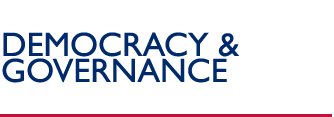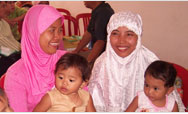 |
 |

 |
 |
Democracy and Governance in Tanzania
Following decades of socialism and economic stagnation, Tanzania
embarked on a fundamental political and economic transformation in the early 1990s. The nation’s first
multi-party elections were held in 1995. A sea of change is now underway, driven increasingly by a new
generation of leaders. Tanzania has made significant strides in its conversion to a market-based
economy. The government has undertaken reforms to contain inflation, control public expenditures and
curb deficit spending, streamline the civil service, divest more than three hundred public enterprises, and
pursue privatization of the key water, electricity, railroads, and telecommunications sectors. Tanzania’s
annual gross domestic product grew about 5.5% in 2002, building on an economic growth trend that is
among the best in sub-Saharan Africa. In return, under the Heavily Indebted Poor Country Initiative, the
country benefits from public sector international debt relief, which freed an estimated $85 million last year
for the pursuit of health and education objectives.
However, Tanzania still faces formidable impediments to progress toward its democratization and
development goals. Challenges include structural obstacles to economic growth, institutional and human
capacity limitations, corruption, the government’s uneasy relationship with civil society organizations
(CSOs), population growth, high rates of infectious disease, and unsustainable natural resource
exploitation. Tanzania ranked 160 out of 175 countries in the 2003 United Nations Development Program
Human Development Index. The World Bank estimates Tanzania’s 2003 per capita income at $277.
Roughly half the population of 34.6 million subsists on less than $0.65 per day, with 40% of Tanzanians
unable to meet their basic daily needs. Only 76% of adults are literate. Although primary school is free
and mandatory, the enrollment rate is only 59%, with just 7% in secondary school. Life expectancy is 50
years and falling, while the infant mortality rate is 104 per 1,000 and rising. Both these phenomena are
largely attributable to a national HIV/AIDS infection rate for which estimates vary around 11%.
Democracy remains fragile. Observers deemed Tanzania’s 1995 and 2000 elections to have been free
and fair on the mainland, but deeply flawed in Zanzibar, where bloodshed followed the contest in 2000.
The two main parties have since negotiated a political reconciliation accord, and Zanzibar’s 2003 byelections
occurred in a peaceful, fair environment. In October 2005, general elections will test the
durability of the electoral process and institutions of democratic governance.
(Excerpted from the 2006 Congressional Budget Justification for Tanzania)
Back to Top ^
|
|
 |
 |
Tue, 30 Aug 2005 15:54:08 -0500
|
|
 |
 |


